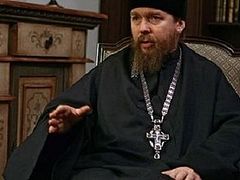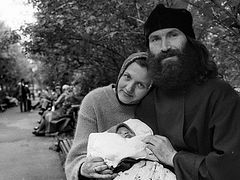St. John Chrysostom wrote, “Turn your home into heaven; you will do this not when you change the walls or rebuild the foundation, but when you invite the Almighty Lord to your repast. God never disregards any kind of supper. Where there is spiritual science, there is humility, sincerity and modesty. Where the husband, and the wife, and the children are in accord and united by the bonds of virtue, there is Christ among them.”
“Turn your home into heaven”
That’s the task. To arrange your family life so that it is just like the life of heaven, to make your apartment be like the paradise.
We have exactly the inverse. My husband comes home imbued with despondency: What awaits me there? What will be her mood?
“How are you doing?”
“Mom is doing the cleaning. And she’s angry.”
“Then everything is fine.”
We yell at each other, exchange a number of rude words, get irritated with each other, show all of our indignation and go to bed. The food is ready, as well as the children’s schoolbags—and that’s enough.
How should we arrange everything so that the hell turns into heaven? Shall we enlarge our home iconostasis, or cense the flat, or draw small crosses above the entrance? The outer attributes are sometimes very useful for our inner life. But the ultimate thing that St. John Chrysostom urges us to do is to take care of are not the walls, but how we arrange our family’s inner life.
“You will do this not when you change the walls or rebuild the foundation, but when you invite the Almighty Lord to your repast”
The saint said these words while preaching in a church. He encouraged his listeners to tell everything that they’d heard in the sermon to their wives and children when they would come home. During John Chrysostom’s times, both people and relationships among them were quite similar to the modern ones. We live in megalopolises—where different cultures blend into one. Descendants of martyrs and neophytes live side by side, as well as heathens and those who are not baptized yet, pagan Christians, Jews, barbarians and people of all other origins.
The church’s parishioners applauded the preacher: What good, right words! (Yes, at those times, people applauded in the church, and it was quite usual.) When back home it’s just as if nothing had happened. There are bi-polar worlds: one is in the church, where we are generous and pious; the other is at home and “in the square”, i.e., among the people, where everything goes in the usual way—a mixture of paganism, languor and egotism. St. John Chrysostom called for combining these two worlds: the realm of the Church and the sphere of “personal life”. He insisted that we bless not only Sunday morning, but our whole lives.
In our day-to-day life, one of the primary and regular events is the family meal. This is the time for the whole family, when we all get together and have a chance to talk. This is the time—sometimes the only period of time for the whole day—when we can be with one another in quietude. That’s the time St. John Chrysostom calls for us to bless, encouraging the formation of unity not only with one another, but also with the Lord.
But how? We have to combine the church with our home. The impressions and conclusions formed during a sermon or a service should be brought before the family, implemented into family life. In the church, we listen. We are apprentices. Now we are not. We’ve learned at least something. And it’s our turn to teach and be teachers in our own family; to be priest of our Domestic Church. St. John Chrysostom often lamented that parents who had duly represented the Church as their spiritual school, didn’t even make a simple attempt to turn their families into a similar school: “Students do not usually devote their time to acquiring knowledge, as they do not study all the time. You will never learn anything by studying all the time. Do not come here [to the Church] if you need nothing more than to learn; otherwise, you will never know anything. You should come here to gain experience so that you can teach others. Tell me, don’t we usually allot a definite amount of time to study or learning various arts? Tell me, don’t those who are constantly studying become a nuisance to their teachers? That was not typical of Christ’s disciples: They always left out those who had already learned something and appointed them to teach the ones who were eager to learn... Just imagine how much time we have to give to preaching both to your brothers living in villages and their own teachers! You entrust us [the clergy] with all this, while you should learn from us, and your wives should learn from you, as well as your children. On the contrary, you leave it all to us.”
Throughout the ages, our teachers, our holy fathers, encouraged parents to instruct their children and not to shift the responsibility onto “prestigious schools”, “wise teachers”, and “the best priests”: “He [the Lord] granted children to parents, and these are the parents whom He will hold accountable. Priests and teachers are the parents’ assistants in the labor of upbringing,” stressed holy New Martyr Vladimir (Bogoyavlensky) in his Handbook on Orthodox upbringing.
If we want our family to turn into the Church, into Heaven, our marriage certificate is not enough; nor is it enough to perform the heroic deed of our time— to not kill the children God grants us. If we want the family to turn into the Church and Heaven, it has be a place for “spiritual science”.
Parents should become teachers of their children—not only those who bore them, provided them with clothes and food, and took them to school. Parents should be priests or even bishops of their Domestic Churches—no more, no less. Holy Martyr Vladimir emphasized that parents “are bishops and supervisors assigned by the Lord to look after their children”. In this matter, the saint’s views are based on the teachings of the holy fathers, St. Augustine, in particular: “Each father of the family (paterfamilias) should keep in mind that he owes his paternity to that name [of God]. He should support, teach, encourage and guide everyone to Christ. He should be generous, he should teach them various disciplines. Thus, the father will perform his Church, episcopal duties in his family, serving Christ in order to always be with Him.”
A family that is similar to school, a family where the life is based on the teaching of the Church, is transfigured:
“Where there is spiritual science, there is humility, sincerity and modesty”
Humility, sincerity, and modesty—each element is important. Peace and quietude make paradise, I believe. That’s exactly what we dream of when we imagine a perfect family, where everything is wonderful and excellent. And it’s the spiritual learning that bears everything.
Now we shall recall the family of St. Basil the Great. It was a marvelous family. The parents raised not only him, the saint and a Father of the Church, but also St. Gregory of Nyssa, St. Macrina, founder of female monasticism, and some other saints. We can and should speak much of them. Let us recall the father. A well-to-do man, he taught his children by himself, though he could have followed the usual practice of the times and could afford to hire a tutor. It was he who taught Basil both “disciplines” and “spiritual science”, combining education with real life, as the family’s friend, St. Gregory the Theologian, recollected. It was up to the mother to bring up the daughters: St. Gregory of Nyssa described how that amazing woman taught the “spiritual science” to St. Macrina, the eldest.
And now let us recall another family of saints, who are almost our contemporaries—the Russian royal martyrs. In their family, the parents controlled their children’s upbringing, fully guiding the educational process. According to researchers, “Tsarina Alexandra Feodorovna was the first and the last empress to handle the problems of child psychology so “thoroughly”. She literally assumed the position of her children’s tutor—a position that had always been held by governesses and generals.”
Nicholas and Alexandra assumed that their principal role as teachers was exactly to master the “spiritual science”. While in under house arrest, the Empress taught various disciplines to her children, particularly the Law of God. The Emperor taught history and geography. The royal parents did not only instruct their children and thoroughly select teachers, but laid the foundation of life on “spiritual science”; they consciously and intentionally shared this knowledge with their children—both by direct instructions and their own example, combining science and real life, just as it was in the family of St. Basil the Great.
Anyone who has ever read the royal martyrs’ letters or reminiscences of them can see that “where there is spiritual science, there is humility, sincerity, and modesty.” We do not need any words, we may just look at a photo of the Royal family to illustrate these words of St. John Chrysostom, and the following words too, I believe:
“Where the husband, and the wife, and the children are in accord and commingled by the bonds of virtue, there is Christ among them”
St. John Chrysostom’s teaching on family—the Christian teaching—is pivoted around these words—very few words.
“Husband, wife and children”
Some people claim: Families used to be much larger before; they included several generations, and “a true Orthodox family” is a generation of grandparents, plus parents, plus their children. Then society slid into nuclear families, comprised of just parents and children. However, according to the Holy Fathers, the true family, the Domestic Church, consists of a father, a mother and their children. The father of these children is the head of this family—the man of the wife—and all the roles and duties are assigned by God. The grandparents are to be treated with deference and respect. Nevertheless, the family, the very sacramental unity, consists of the man—the head of whom is Christ—and his wife and their children granted to them for upbringing.
“In accord and love (ὁμόνοια καὶ φιλία)”
In the Greek version, we read “and accord” instead of “in accord”—“where the husband, and the wife, and the children are both love and accord...”
St. John believed that love and accord are crucial in marriage. All other things are just means of attaining it. For instance, the notorious obedience [of a wife to her husband] may help the wife be in perfect harmony with her husband.
Accord (ὁμόνοια) stands for the “unity of thoughts”, the same way of thinking—when the husband and the wife think in the same way, as if they were one person. Everything they have is common to both of them—their thoughts, views and opinions. They try to understand each other, respect each other, to take each other just the way they are. Should disagreement arise, they try to smooth it out, cover and fix it. Rejecting their own ambitions and pride, they give in because they wish to be together. “We” is more important than “I”. They agree with each other both in their words and thoughts...
Compatibility is the foundation of marriage. It’s the foundation of the whole house.
According to St. John Chrysostom, the foundation of the science of family life is concord between the man and the wife: “If they [the husband and the wife] have the same mind—their children will be well bred, their servants will abide in a favorable atmosphere, and their neighbors, friends and relatives will enjoy their fragrance.”
It’s easy to understand why this is true. Let us ponder over it: If the spouses live in love and concord, what kind of life do they have? The family life is permeated with quietude and peace, and tenderness, and comfort. Comfort is synonymous to alleviation, which duly defines life in such a family. Thus, we turn our home, the place where our children live, into a place of comfort and physiological ease. That is the key to the healthy development of the child’s personality, creativity and so on and so forth.
If the spouses have the same mind and opinions, then the child’s most important teachers are in concord. These teachers’ concord is a guarantee that they act in unison bringing up the child, which is the key to successful family educational science.
Then, voilà! Life turns into paradise if the husband and his wife live in love and accord.
Misunderstanding may lead to a collapse. In order to imagine every detail, let us assume that the situation can be exactly the opposite. Let us imagine the children growing up in a family where parents constantly disagree, quarrel and argue—they know nothing of love, harmony and compatibility.
Unfortunately, there’s no need to imagine. In Russia, the majority of marriages end in divorce. Obviously, a vast majority of children (!!!) are growing or have already grown up in families, where parents didn’t strive to save their love, to be compatible and like-minded. They lived amidst insults and quarrels. They saw their parents argue about who was wrong and who was right. Moreover, sometimes they become witnesses to assaults.
Children spend years as their parents get ready for a divorce; then they go through the divorce itself and have to handle the aftermath of the separation. That contradicts comfort and psychological ease. That has nothing in common with the parents who act in unison bringing up their children.
We may compare that to the Church and the calamity of schisms and heresies. That’s not the heaven that St. John Chrysostom spoke about, but hell. Let us look at all this from a different perspective, and forget our personal “special cases” and grudges against our spouses. Let us imagine they we are just seeking some abstract conditions for our beloved children to live in. We are very unlikely to want our children to be in such a hell—even if this hell be temporary. We will hardly dare believe that we can build a Domestic Church amidst our quarrels, anger, impatience or even hatred, and turn our home into a place where we can teach anyone spiritual science.
Love and concord lay the foundation for upbringing.
Thus, let us strive to attain love and concord
Therefore, within all these years, making all attempts to raise our children, we should pay the utmost attention to taking care of relationships with our husband or our wife. Even if the ediface of educational creativity is embellished with so-called Orthodox attributes, it will imminently collapse without that foundation, burying us all under its rubble.
This metaphor doesn’t belong to me; it was St. John Chrysostom who created it: “Divorce destroys our whole life just as an earthquake shakes the whole building, filling the universe with unrest, wars and disputes.”
According to St. John, the path to compatibility is obedience and mutual respect, and the crucial thing is love: “Compatibility is a very difficult and troublesome thing if the spouses are not united by the power of love.”
“…united by the bonds of virtue (ἀρετῆς)”
Spouses need love and accord and should strive for virtue, too. Virtue is the value of the family. Virtue is similar to bonds or a bridle that is used to control our life. At least it should control our life. It has to be our goal, it has to be our conviction—virtue should control our life.
“There is Christ among them (μέσος)”
He is among them, inside their house. He is there as the head of the family, the head of their Domestic Church. He’s the Lord Himself, and nothing more is needed.
“Turn your house into heaven; you will do this not when you change the walls or rebuild the foundation, but when you invite the Almighty Lord to your repast. God never disregards any kind of supper. Where there is spiritual science, there is humility, sincerity and modesty. Where the husband, and the wife, and the children are in accord and commingled by the bonds of virtue, there is Christ among them.”







